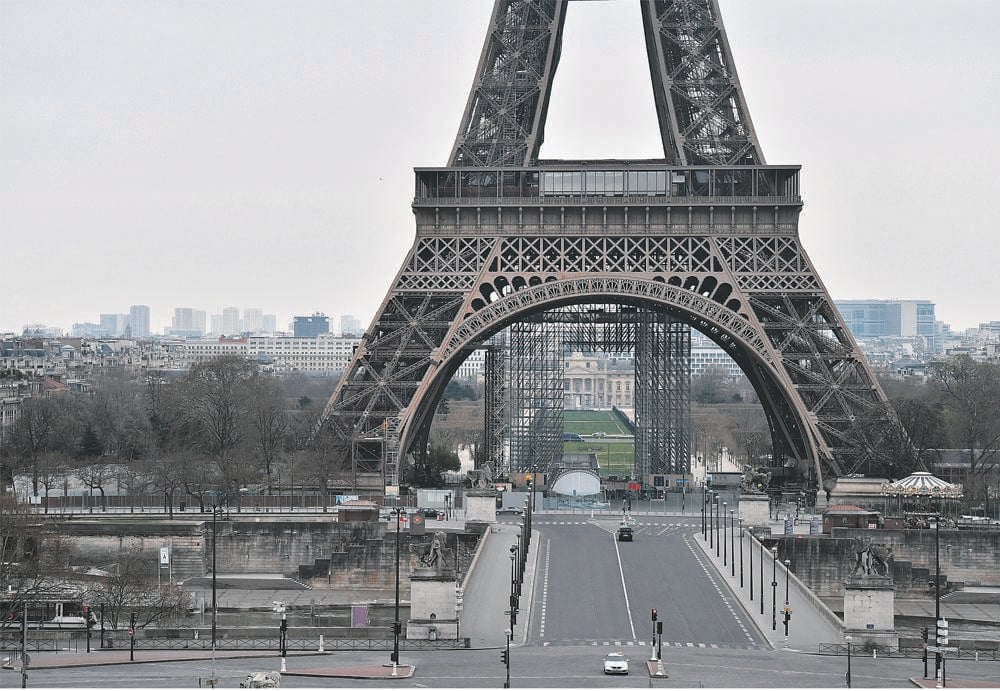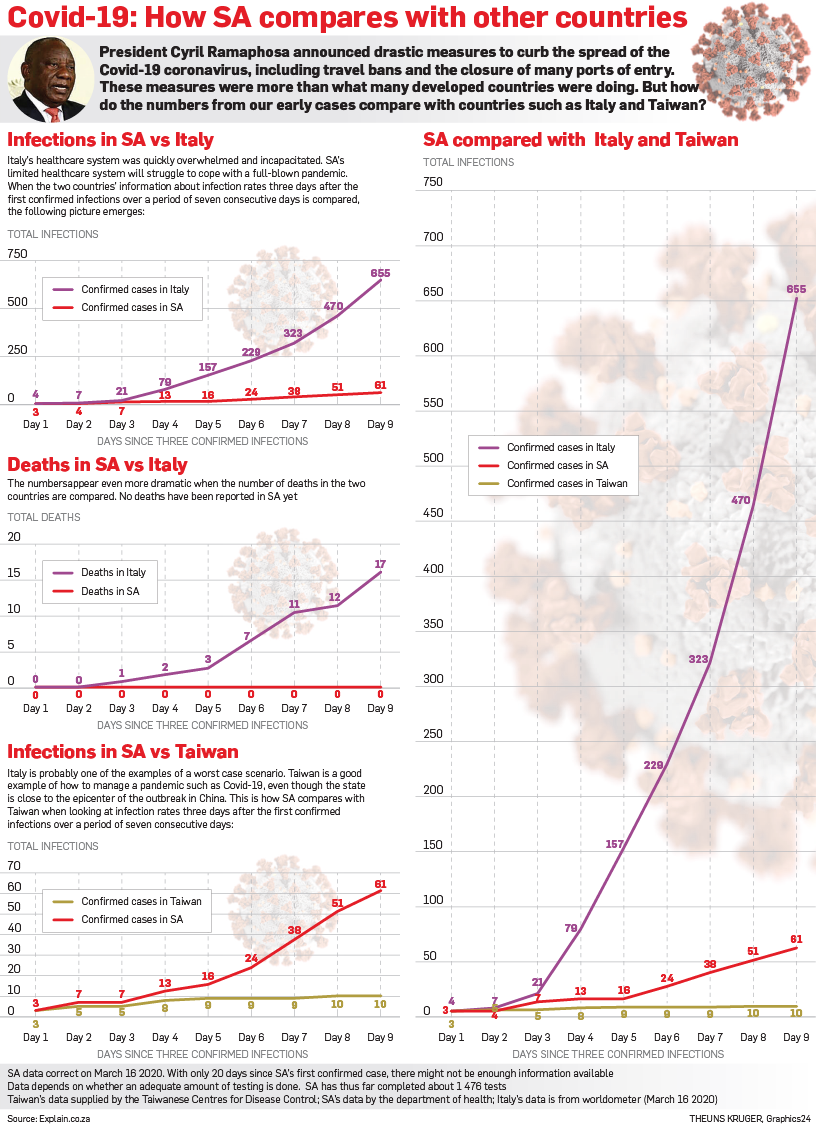
“Contain, contain, contain!”
That is the message from National Treasury to the government, warning that the state should do “whatever it takes” to contain the spread of the Covid-19 coronavirus.
A Treasury memorandum obtained by City Press warns that, should authorities fail to act decisively and boldly, the spread of Covid-19 is likely to develop into a crisis that will wreck stock markets and badly hurt the already paralysed economy.
The memorandum, titled Economic Response Packages, preceded a high-powered meeting yesterday between Treasury, the SA Reserve Bank and the SA Revenue Service on measures to shore up the economy and protect small businesses as well as ordinary South Africans from the effects of the pandemic.
The details of the Economic Response Packages will be unveiled this week.
As the government’s restrictive measures, aimed at curbing the spread of the virus, kicked in this weekend, the National Institute for Communicable Diseases announced that the number of infected people in South Africa had climbed to 240, up from 202 on Friday.
The communique reflects the increasing pattern of local infections and the exponential growth in numbers.
The presidency said yesterday that the National Command Council would meet today to assess the implementation of the directives announced by the president last Sunday.
Thereafter, the president will decide on when to update the nation about any further measures to mitigate the impact of the virus.
Globally, there are 308 595 infected people and almost 13 069 have died as a result of Covid-19. Following drastic measures taken by various governments this week to fight the spread, about a billion people are under lockdown.
A senior government official told City Press yesterday that the exponential growth in infection rates showed that the pandemic was becoming a threat to national security, which might compel President Cyril Ramaphosa’s administration to up the ante from the State of National Disaster he declared last Sunday.
“If we continue in the same vein, we are heading for a state of emergency; it is unavoidable,” said the insider.
“In a state of emergency there will have to be a total shutdown,” the insider said, but was quick to add that food would still be available and that there was no need to panic-buy if that decision was taken.
Triple crisis
The Treasury document warns that South Africa will face “a triple crisis” in the coming weeks as the country deals with the electricity crisis, community contagion emanating from Covid-19 and financial contagion raining down as a result of market uncertainty. “All these against the backdrop of the current recession,” said Treasury.
Concerned about the dire health, economic, fiscal and governmental implications of Covid-19, Treasury has convened its own internal task team to deal with the impact of the pandemic on South Africa.
The institution, which is at the heart of the country’s economic and financial management, has held urgent consultations with financial sector regulators to assess the effect on the financial sector’s stability.
“The coronavirus will also bankrupt many companies and people, which itself will constitute an emergency when its economic impact is taken into account,” said the government department.
“The key message that Treasury proposes is ‘contain, contain, contain’ and for government to do whatever it takes to ‘contain, contain, contain’,” reads the document.
It argues that “it is better to overprepare than to underprepare for the coming crisis.”
It suggests that disruptions in the economy could continue for up to six months, advising that “lockdown measures may also have to be considered, and planning for such a step should be undertaken immediately”.
Big things are coming
While governments in European and North American countries have unveiled massive stimulus plans to shield their economies, the memorandum concludes that this is neither practical nor affordable for South Africa.
“A large stimulus package at this point may prove costly but ineffective. Given the tough fiscal position of the country, a further stimulus can only be financed by further debt, which is already rising steeply even after the medium-term expenditure framework, and is simply not affordable,” the document says.
Rather, the Treasury proposes, there should be fiscal support to ensure the containment of the pandemic over the “critical” next few weeks.
A senior Treasury official told City Press that officials in the finance ministry and the Reserve Bank, as well as other senior bureaucrats, were this week locked in marathon meetings aimed at developing a “financial package to support the economy”.
“There are big things coming. There is a package of financial measures aimed at easing pressure on the economy, businesses and South Africans in general. This thing affects everyone, including me and you. We are trying to soften the blow on the economy, small businesses and the general public,” said the official.
This has never happened in our lifetimes
The havoc being wreaked by the virus is being felt most acutely in the hospitality industry, which has been seen as the potential saviour of the local economy and the low-hanging fruit for getting unskilled workers into employment.
Sisa Ntshona, chief executive officer (CEO) of SA Tourism, said this sector was the one most affected by Covid-19 as it was on the front end of the economy.
“It will really affect the whole economy, but we get hit the first. Airlines stop flying, hotels are empty and jobs are at risk. When things do improve, we will be the first to recover, but we are a perishable product and the impact is felt quickly. It will get difficult before it gets better. Many will not survive,” he said.
He said the cancellation or postponing of events such as the Cape Town International Jazz Festival, the Travel Indaba in Durban, the World Opthalmology Congress in Cape Town, the Rand Easter Show in Joburg and the Cape Town Cycle Tour would result in losses running into hundreds of millions.
Marcel von Aulock, CEO of Tsogo Sun, South Africa’s biggest hotel group, said the company had experienced a significant reduction in bookings.
Read: SA doctors flag coronavirus reaction to HIV and TB
“We have 19 000 rooms, and we are starting to consolidate and close down 40% of our room stock. If we have two hotels close to each other, we will shut down one and leave the other. Global travel has ceased,” he said.
While the company had no plans to retrench workers in the short term, he said the effect of Covid-19 on the tourism industry at large was significant. “In the short term, we do not want to retrench, but it means that if nothing is done to fix the situation, jobs will be at risk.”
Von Aulock said the situation was “unprecedented”, adding that two weeks ago he would not have imagined that the group might have to remove 40% of its room stock from the market.
He said he had been receiving messages about smaller hotels, guesthouses and lodges going out of business.
Craig Newman, CEO of the 126-year-old Rand Easter Show, said the effect of the cancellation of the iconic annual expo would “be felt from cleaning to security to technicians, electricians and many other suppliers”.
“But safety comes first and we have had to adhere to calls to curb the virus that is destroying the world.
“The virus is actually killing businesses more than it is actually killing people. How many businesses have had to shut down?
“The biggest casualty across the world are small businesses, many of them within the exhibitions and events space. It is crazy, scary and unprecedented, and has never happened before in any of our lifetimes.”
No to opportunists and chance-takers
Small Business Development Minister Khumbudzo Ntshavheni said government’s new R1 billion Covid-19 coronavirus emergency support package for small businesses would be stringently protected from opportunists who would try to abuse it by “double dipping” and setting up shelf companies just to fraudulently claim business distress.
The fund, which will consist of money redirected from the department’s other programmes that are not urgent, could range from soft loans for debt relief to capital injection for business growth. It will assist small, medium and micro enterprises that can demonstrate the negative effects rendered by the Covid-19 pandemic on their operations. It will go online by Tuesday.
The criteria for support include factors such as the size of the operation and the severity of the impact or potential impact of the pandemic on the business.
Companies which qualify for support will also have to be 100% locally owned and have a staff complement comprising 70% of South Africans.
The database will also be used by government and the private sector to identify potential local suppliers which are not in the mainstream economy.
“There are three things we are trying to achieve with the database,” said Ntshavheni.
“Firstly, we are saying to all of government: ‘Let us use this database to support small business.’ If we get them into the database, then we can all track who has been supported and who has not been supported.
“Secondly, we would be able to verify that the entities exist and do trade, so that we remove the opportunists.
“And thirdly, we want to be able to quantify the impact of the pandemic. Currently, we are talking in general terms. We cannot confidently say how many small companies are affected and in which sector,” she said.
Ntshaveni said the reality was that many small operations such as restaurants and shuttle services would close as citizens were advised to stay in their homes.
She said that financial lenders such as banks would normally allow for instalments to be rescheduled, but that would mean repayments would double or triple come the due date.
“We want to be able to say that we will pay something for the company in this period, just to make sure that people’s repayment amounts are not affected.”
Ntshavheni said the government’s intention was to keep small traders afloat as best as possible and give them “a fighting chance of coming back into the business”.
“Remember, they are saddled with this debt. The likelihood is that when they come back, they are going to be blacklisted and all those things,” Ntshaveni said.
Small traders will also be assisted to enter the mainstream market and compete when it comes to the supply of critical goods such as hand sanitisers, face masks and disinfectants, which have seen shortages because of high levels of demand and panic-buying.
 | ||||||||||||||||||||||||||
Get in touchCity Press | ||||||||||||||||||||||||||
| ||||||||||||||||||||||||||
| Rise above the clutter | Choose your news | City Press in your inbox | ||||||||||||||||||||||||||
| City Press is an agenda-setting South African news brand that publishes across platforms. Its flagship print edition is distributed on a Sunday. |




 Publications
Publications
 Partners
Partners











